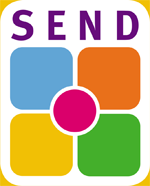SEND & AP Change Programme
ELSEC

Shropshire, Telford and Wrekin only
ELSEC is part of the SEND and AP Change Programme. It is a DfE pilot project to consider how targeted speech and language support at an early age can improve outcomes for children and young people. The project is a collaboration between children, their parents and professionals and is led by an ELSEC team made up of both health and education colleagues. The DfE will collect data from the project until April 2026, although Telford and Wrekin have funding to continue to work with schools and nurseries until July 2026. The school and nurseries involved in the project from September 2025 (Wave 2) are:
- Aqueduct Primary Academy
- John Randall Primary School
- Millbrook Primary Academy
- Old Park Primary School
- Priorslee Academy
- Redhill Primary Academy
- Shortwood Primary School
- St Patrick’s Catholic Primary School
- Wombridge Primary School
- Wrekin View Primary School
The nurseries currently involved are:
- Busy Bees Nursery
- Church Street Nursery
- Halesfield Day Nursery
Read our latest newsletter.
Who is the ELSEC team?
ELSEC Project Lead: Gillian Hackett (Speech and Language Therapist)
ELSEC Advanced Practitioner for Education: Joanne Preston
Advanced Practitioner Speech and Language Therapists: Nikki Stinton, Tracey Inniss, Rebecca Jones
Higher Level Teaching Assistants (HLTAs):
- Christina Mitchell
- Kerry Nicholls
- Laura Taylor
- Rachel White
- Litsa Kitchin
- Sarah Bryan
- Wendy Marsh
- Rebecca Fenn
- Hardip Dhanjal
- Laura Hall

For any enquiries please e-mail: [email protected]
ELSEC for parent carers
Every child in Year 1, Reception and in the pre-school year will have been screened using the Talk Boost tool, in all of the settings listed on the main ELSEC page, to determine whether they would benefit from being in the small, targeted group for a Talk Boost intervention.

The current wait time for a speech and language appointment is significant and although being part of the ELSEC programme will not speed this up, it is just one of strategies schools and nurseries will use to help your child with their language skills. Talk Boost is an intervention that is run 3 times a week over 9 – 10 weeks. It involves:
- Small group sessions led by specially trained staff, 3 times a week
- A weekly whole class activity led by the class teacher
- Parent workshops for children in Nursery or Reception
- A weekly story to be shared with families
- Lots of practical resources including instruments, toys and the characters Jake and Tizzy, in the Early Talk Boost programme.

You will have been made aware if your child is part of a Talk Boost group and may have been invited to a parent workshop too. For more information about Talk Boost, please follow the link:
Talk Boost - Speech and Language UK: Changing young lives
The Speech and Language UK site has lots of advice, support and ideas for parents.
Resource library for families - Speech and Language UK: Changing young lives
The BBC CBeebies site has lots of useful information for parents of young children, including ideas and support for communication and language:
Skills for starting school - advice for parents
ELSEC for professionals
ELSEC is a DfE pilot programme, with education and health working together to build capacity amongst schools, settings and parents to improve the outcomes for children with speech, language and communication needs (SLCN).
Locally, we are using Talk Boost as the main intervention to identify and support children with language needs in Y1, Reception and the pre-school year. Additionally, the ELSEC team offer a dedicated HLTA for intervention, training and support in every setting involved, with a specialist teacher or speech therapist leading communication audits and parent workshops.
Additional specialist interventions include Building Early Sentence Therapy (BEST), Concept Cat and the narrative pack.
Overall aims of the programme include:
- Early intervention to address SLCN, thus increasing life outcomes for children and young people.
- To increase capacity amongst school and nursery staff to meet the needs of children with SLCN.
- Increased understanding of and access to the universal offer for parents to support their children with SLCN.
- A reduction in the number of speech and language referrals so that the most appropriate referrals can be seen in a timely manner.
In October a learning lunch further explained ELSEC.
For termly updates, please find the SEND newsletters here.
Key links:
Resources for Speech and Language Needs
This range of resources are useful for finding out more information and supporting both parents and professionals.
NHS Speech and Language website in Telford and Wrekin: Speech & language therapy
Speech and Language Support for parents from NHS: Speech, language, communication needs
Healthier Together Website: Home
Speech and Language UK:
Help for families: Resource library for families - Speech and Language UK: Changing young lives
Help for schools and settings: Resource library for educators - Speech and Language UK: Changing young lives
Help for families:
Resource library for families - Speech and Language UK: Changing young lives
Help for schools and settings:
Resource library for educators - Speech and Language UK: Changing young lives
Wave 1 settings
- William Reynolds Primary (until March 2025)
- Meadows Primary
- St Luke's CE Primary
- Hollinswood Primary
- Lawley Village Academy
- Windmill Primary School
- Lawley Primary
- St Mary's CE Primary
- Chec Mates
- Puddleducks
- ABC Hollinswood
- Madeley Nursery School
- Woodentops
- Oakengates Nursery
